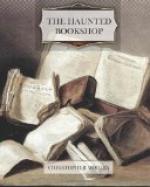“They only think they are!” cried Mifflin. “They think they’re amused because they don’t know what real amusement is! Laughter and prayer are the two noblest habits of man; they mark us off from the brutes. To laugh at cheap jests is as base as to pray to cheap gods. To laugh at Fatty Arbuckle is to degrade the human spirit.”
Titania thought she was getting in rather deep, but she had the tenacious logic of every healthy girl. She said:
“But a joke that seems cheap to you doesn’t seem cheap to the person who laughs at it, or he wouldn’t laugh.”
Her face brightened as a fresh idea flooded her mind:
“The wooden image a savage prays to may seem cheap to you, but it’s the best god he knows, and it’s all right for him to pray to it.”
“Bully for you,” said Roger. “Perfectly true. But I’ve got away from the point I had in mind. Humanity is yearning now as it never did before for truth, for beauty, for the things that comfort and console and make life seem worth while. I feel this all round me, every day. We’ve been through a frightful ordeal, and every decent spirit is asking itself what we can do to pick up the fragments and remould the world nearer to our heart’s desire. Look here, here’s something I found the other day in John Masefield’s preface to one of his plays: ’The truth and rapture of man are holy things, not lightly to be scorned. A carelessness of life and beauty marks the glutton, the idler, and the fool in their deadly path across history.’ I tell you, I’ve done some pretty sober thinking as I’ve sat here in my bookshop during the past horrible years. Walt Whitman wrote a little poem during the Civil War—Year that trembled and reeled beneath me, said Walt, Must I learn to chant the cold dirges of the baffled, and sullen hymns of defeat?—I’ve sat here in my shop at night, and looked round at my shelves, looked at all the brave books that house the hopes and gentlenesses and dreams of men and women, and wondered if they were all wrong, discredited, defeated. Wondered if the world were still merely a jungle of fury. I think I’d have gone balmy if it weren’t for Walt Whitman. Talk about Mr. Britling—Walt was the man who ‘saw it through.’
“The glutton, the idler, and the fool in their deadly path across history. . . . Aye, a deadly path indeed. The German military men weren’t idlers, but they were gluttons and fools to the nth power. Look at their deadly path! And look at other deadly paths, too. Look at our slums, jails, insane asylums. . . .
“I used to wonder what I could do to justify my comfortable existence here during such a time of horror. What right had I to shirk in a quiet bookshop when so many men were suffering and dying through no fault of their own? I tried to get into an ambulance unit, but I’ve had no medical training and they said they didn’t want men of my age unless they were experienced doctors.”




